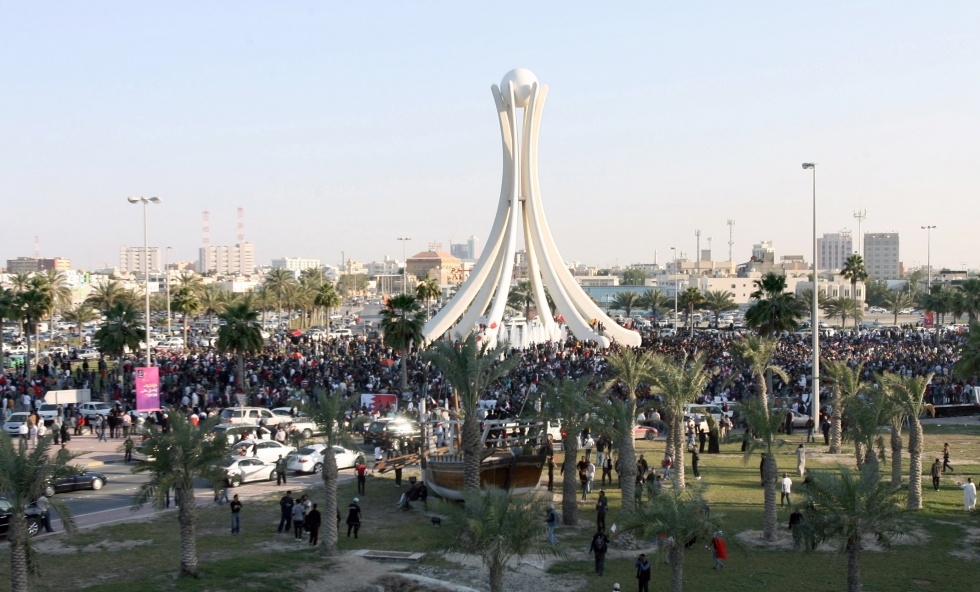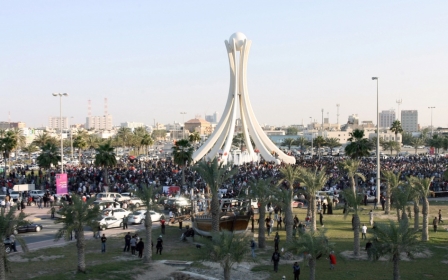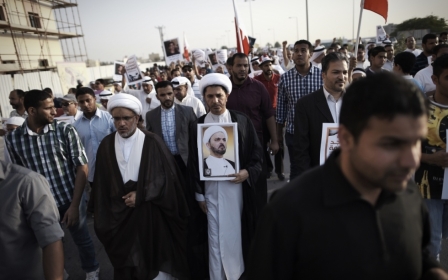GCC ministers cancel EU meeting after criticism of Bahrain's human rights record

Foreign ministers from the Gulf Cooperation Council (GCC) have reportedly cancelled an upcoming meeting with their EU counterparts, in protest at member states having signed a statement at the UN Human Rights Council condemning Bahrain’s human rights record.
GCC Secretary-General Abdul Lateef al-Zayani is said to have informed EU foreign policy chief Catherine Ashton that the meeting scheduled for 23 June will not take place as planned, according to unnamed GCC diplomatic sources who spoke to Al Arabiya.
The sources said the meeting had been cancelled because of a statement read out criticising Bahrain’s rights record at the UN Human Rights Council on 10 June, which was signed by 47 countries including all 28 EU member states.
The statement expressed “serious concern” at the human rights situation in Bahrain, with signatories criticising “increases in long [prison] sentences for exercising rights to freedom of peaceful assembly and of association”. The 47 state signatories said they were “troubled by continuing reports of ill-treatment and torture in detention facilities”, urging a “thorough and impartial investigation” into allegations of mistreatment.
Concern was also raised about Bahrain’s courts, which the Human Rights Council members said lacks “sufficient guarantee of fair trial”, and is criticism that comes three weeks after Human Rights Watch released an extensive report criticising the criminal justice system. The US-based watchdog slammed Bahraini authorities for failing “to deliver basic accountability and impartial justice”, with Deputy Middle East Director Joe Stork saying “Bahrain’s problem is not a dysfunctional justice system, but rather a highly functional injustice system”.
Bahrain has been in the grip of an uprising against the monarchy for three years, which began in the capital Manama on 14 February 2011 when hundreds of thousands of people gathered at the Pearl Roundabout to call for democracy. Three days later, government forces broke up protest camps with teargas, birdshot and batons that left at least two dead and hundreds injured.
Since then activists say almost 100 protesters have died in the unrest, although the government disputes these figures and says 13 police officers have been killed in attacks on their forces. Most recently a 14-year-old boy was shot and killed by security forces on 22 May, according to Human Rights Watch who have demanded authorities conduct a “swift, thorough and impartial” investigation into the death of Sayed Mahmoud.
The statement made in Geneva last week was not exclusively critical and did welcome “the positive steps taken by the Government of Bahrain to improve the human rights situation”, noting the establishment of a number of new institutions ostensibly setup to improve prison conditions and treatment.
Authorities have recently introduced the Office of the Police Ombudsman and the Prisoners’ and Detainees’ Rights Commission, as well as setting up a National Human Rights Institution. UN Human Rights Council members urged “these institutions to proactively fulfil their mandate” and encouraged the Bahraini government “to uphold its commitment to these institutions and their independence”.
A Bahraini delegation that attended the Geneva session, where the joint statement was readout by a Swiss representative, said it did not effectively reflect improvements made in the human rights situation.
“While acknowledging the positive steps undertaken by the Government of Bahrain to consolidate human rights, the statement failed to take into account the tangible improvements officially documented in a series of reports issued since the beginning of the year,” the Bahraini delegation said. “The statement undermines the unrelenting and sincere efforts undertaken by the Kingdom of Bahrain to carry out human rights obligations, whether locally or internationally,” they added.
“Extremists find in such statements an excuse to continue crisis-mongering and political and security escalation in Bahrain.”
Bahraini human rights activists said the GCC were attempting to silence criticism from the EU and welcomed the UN statement but questioned whether it would have any impact on the ground.
“The ministers cancelled the meeting to put pressure on the EU not to speak about human rights in the GCC,” said Said Yousif, head of monitoring at the Bahrain Centre for Human Rights. “We welcome the statement by the Human Rights Council, but we demand a resolution to stop the human rights abuses in Bahrain, as this is the third joint statement but the situation is deteriorating and more innocent people are being killed.”
“Dictators don’t respond to joint statements, there must be sanctions to end human rights abuses in Bahrain,” he added.
New MEE newsletter: Jerusalem Dispatch
Sign up to get the latest insights and analysis on Israel-Palestine, alongside Turkey Unpacked and other MEE newsletters
Middle East Eye delivers independent and unrivalled coverage and analysis of the Middle East, North Africa and beyond. To learn more about republishing this content and the associated fees, please fill out this form. More about MEE can be found here.




